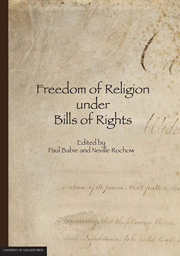Book contents
- Frontmatter
- Contents
- Acknowledgments
- List of Contributors
- Foreword by The Hon Sir Anthony Mason AC KBE: Human Rights and Courts
- INTRODUCTION
- SETTING THE SCENE
- CONTEMPORARY FREEDOM OF RELIGION ISSUES
- COMPARATIVE EXPERIENCE WITH FREEDOM OF RELIGION
- 9 Political Culture and Freedom of Conscience: A Case Study of Austria
- 10 The Sky is Falling if Judges Decide Religious Controversies! – Or is it? The German Experience of Religious Freedom Under a Bill of Rights
- 11 Religious Freedom in a Secular Society: The Case of the Islamic Headscarf in France
- 12 Religious Freedom in the UK after the Human Rights Act 1998
- 13 Judicial Interpretation, Neutrality and the US Bill of Rights
- 14 Protecting Religious Freedom: Two Counterintuitive Dialectics in US Free Exercise Jurisprudence
- 15 Walking the Tightrope: The Struggle of Canadian Courts to Define Freedom of Religion under the Canadian Charter of Rights and Freedoms
- 16 Quo Vadis The Free Exercise of Religion? The Diminishment of Student Religious Expression in US Public Schools
- 17 Freedom from Discrimination on the Basis of Religion
- 18 Ruminations from the Shaky Isles on Religious Freedom in the Bill of Rights Era
- 19 Indigenous Peoples and Bills of Rights
- TABLE OF LEGISLATION AND INTERNATIONAL INSTRUMENTS
- INDEX
10 - The Sky is Falling if Judges Decide Religious Controversies! – Or is it? The German Experience of Religious Freedom Under a Bill of Rights
from COMPARATIVE EXPERIENCE WITH FREEDOM OF RELIGION
Published online by Cambridge University Press: 05 June 2013
- Frontmatter
- Contents
- Acknowledgments
- List of Contributors
- Foreword by The Hon Sir Anthony Mason AC KBE: Human Rights and Courts
- INTRODUCTION
- SETTING THE SCENE
- CONTEMPORARY FREEDOM OF RELIGION ISSUES
- COMPARATIVE EXPERIENCE WITH FREEDOM OF RELIGION
- 9 Political Culture and Freedom of Conscience: A Case Study of Austria
- 10 The Sky is Falling if Judges Decide Religious Controversies! – Or is it? The German Experience of Religious Freedom Under a Bill of Rights
- 11 Religious Freedom in a Secular Society: The Case of the Islamic Headscarf in France
- 12 Religious Freedom in the UK after the Human Rights Act 1998
- 13 Judicial Interpretation, Neutrality and the US Bill of Rights
- 14 Protecting Religious Freedom: Two Counterintuitive Dialectics in US Free Exercise Jurisprudence
- 15 Walking the Tightrope: The Struggle of Canadian Courts to Define Freedom of Religion under the Canadian Charter of Rights and Freedoms
- 16 Quo Vadis The Free Exercise of Religion? The Diminishment of Student Religious Expression in US Public Schools
- 17 Freedom from Discrimination on the Basis of Religion
- 18 Ruminations from the Shaky Isles on Religious Freedom in the Bill of Rights Era
- 19 Indigenous Peoples and Bills of Rights
- TABLE OF LEGISLATION AND INTERNATIONAL INSTRUMENTS
- INDEX
Summary
Most modern Western societies operate under a broadly secular system of government. Germany is no exception. Among the fundamental features of a secular polity are State neutrality in questions of faith, the absence of a State religion, the toleration of all beliefs (religious or not) and the guarantee of the individual's freedom to believe or not to believe and to exercise his or her religion.
Despite this fundamentally secular orientation of the State, many people have strong feelings about religious issues. Occasionally, these views can trigger heated, emotive and widespread public debate, particularly when the belief systems of different religious groups or of believers and non-believers come into conflict. An extreme example is the worldwide controversy about the publication of cartoons of the Prophet Muhammad in the international press, which even resulted in violence and a number of deaths. Other examples include the debate on introducing Sharia law and on the regulation of displaying or wearing of religious symbols or clothing in public settings in Western countries.
Two questions that touched a nerve in German society were whether the State could require that crucifixes are installed in all primary school classrooms and if a Muslim teacher could wear the Islamic headscarf (hijab) while teaching in a public school. Both of these questions are morally and politically highly controversial. They are the type of questions for which there is no easy answer and where every answer given is bound to have its detractors.
- Type
- Chapter
- Information
- Freedom of Religion under Bills of Rights , pp. 190 - 215Publisher: The University of Adelaide PressPrint publication year: 2012



